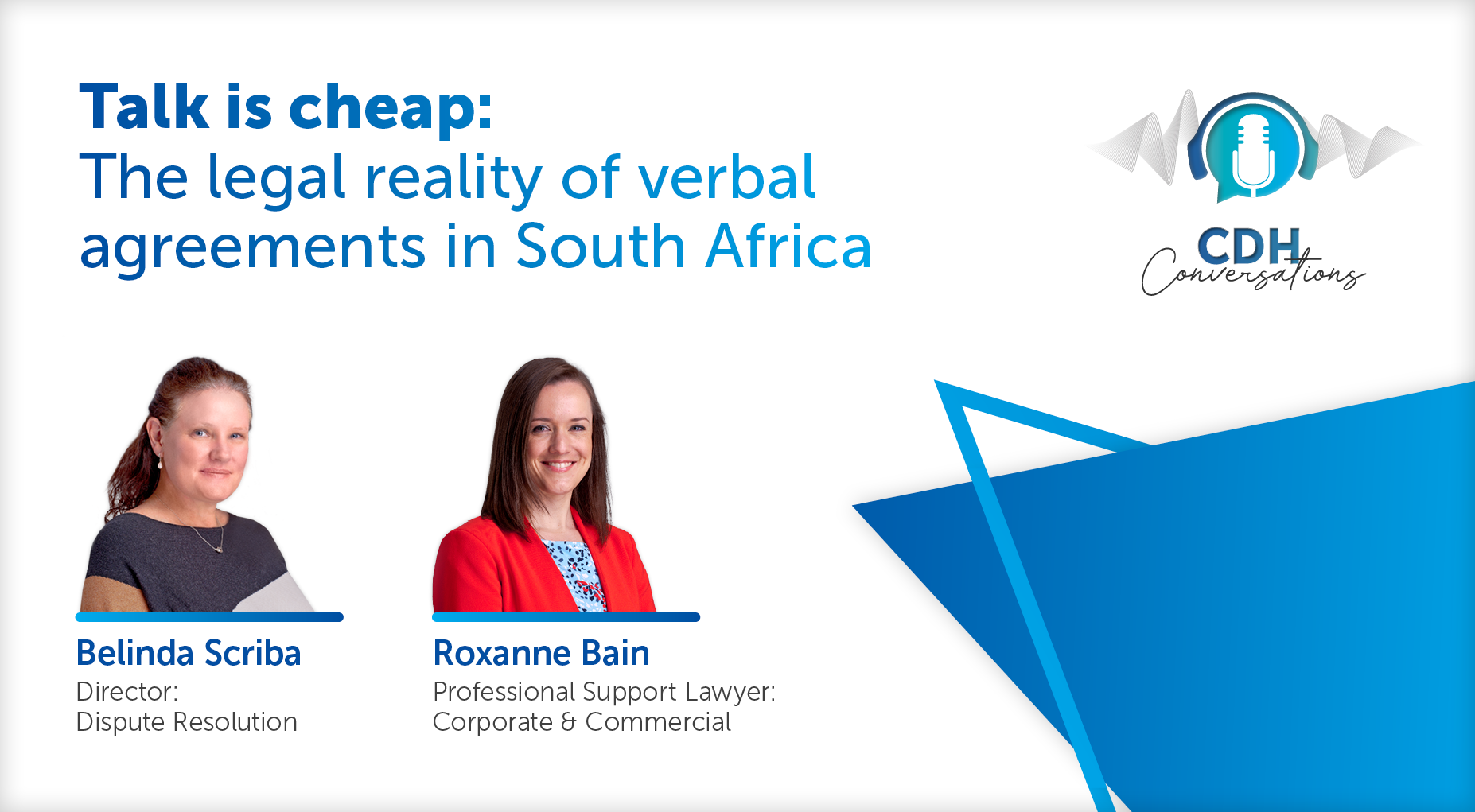Directors, beware: Communication and transparency is the key
It was pointed out in the concurring judgment, that in order to avoid liability, as soon as the board of directors, a CEO or MD becomes aware that someone is purporting to act on behalf of the company without the requisite authority, they should immediately inform the third party that “no agreement could be concluded without reference to higher authority” within the company. In taking this caution a step further, we are of the view that companies ought to take a more proactive and robust approach when dealing with third parties.
The facts are well known. The appellant (Mr Makate), a trainee accountant at Vodacom, developed the idea to allow a Vodacom subscriber, without airtime, to “buzz” another subscriber in order to induce the latter to return the call. It is this notional idea that developed into the well-known “Please Call Me” service.
Eight years after the “Please Call Me” product was launched, Mr Makate sought remuneration for his idea. He claimed that he entered into an oral agreement with Vodacom’s Director of Product Development and Management (Mr Geissler) in which he would be rewarded with a share of the revenue generated by the concept, if it turned out to be commercially and technically viable, which it certainly did. Crucially, Mr Makate also claimed that if an agreement on his remuneration could not be reached, Vodacom’s CEO would determine a reasonable amount, acting as a dead lock breaking mechanism in the negotiation.
The High Court agreed that a contract was indeed concluded on Mr Makate’s terms, but found that he failed to prove that Mr Geissler had the ostensible authority to bind Vodacom.
On appeal to the Constitutional Court, Mr Makate had to overcome two major obstacles. First he had to show that his claim had not prescribed and second, that Mr Geissler had the ostensible authority to bind Vodacom. In this article, we focus on the latter as a caution to CEOs and directors when dealing with third parties, including employees.
Simply put, ostensible authority refers to a situation in which a board may appoint one of their members to be its CEO. When it does so, the board invests in the CEO “not only implied authority, but also with ostensible authority to do all such things that fall within the usual scope of that office”. Thus “sometimes, ostensible authority exceeds actual authority”. (Hely-Hutchinson v Brayhead Ltd and Another [1968] 1 QB 549 (CA) at 583 A-G.)
For instance, the CEO, or any director for that matter, may have the authority to procure services limited to R1 million, without board approval. Other people who come into contact with the CEO, or director, are entitled to assume that he or she has the usual powers of a CEO, or director, involved in the operations of the company.
Thus, if the CEO procures a service for R1,5 million without board approval, the company can be bound by the CEOs ostensible authority when dealing with those who do not know the limitations of the their actual authority. (See Hely-Hutchinson v Brayhead Ltd and Another [1968] 1 QB 549 (CA) at 583 A-G.)
Thus, the Constitutional Court remarked that ostensible authority must also be considered “with the view to doing justice to all concerned”.
Prior to Makate, the leading case on the issue of ostensible authority was NBS Bank Ltd v Cape Produce Company Pty Ltd and Others 2002 (1) SA 396 (SCA). The crux of NBS Bank is that ostensible authority is a form of estoppel: a situation in which the principal represents to an innocent third party that its agent, had the authority to act on its behalf and the third party reasonably relied on the principal’s representation.
In that circumstance, the principal is prevented or estopped, from saying that the agent did not have the necessary authority to act on its behalf if the innocent third party proves that they suffered prejudice due to the principal’s representation and that the principal should reasonably have expected that third parties would rely on its representation.
In both instances, the agent acting on the principal’s behalf has no real, actual or implied, authority. However, estoppel serves as a mechanism through which to attribute authority to the principal, to remedy the prejudice suffered by the unknowing, innocent third party, and “bring justice to all concerned”.
The majority judgment of the Constitutional Court quoted the above requirements for estoppel as laid down in the NBS Bank decision. It also referred to the requirements of estoppel under the common law, which are virtually the same as the requirements for ostensible authority. However, it then found that NBS Bank conflated ostensible authority with estoppel and that the requirement that “the principal must have expected that the other party would act on the strength of his representation…is illogical” as the principal “cannot have this expectation if in the first place he did not intend to create the impression” [Emphasis added].
In so doing the majority judgment appears to have underestimated the extent to which companies, or principals, reasonably and with good faith, expect their agents to act consistently with the powers conferred on them. It follows that a company may not intend to be bound to a contract concluded by its agent acting beyond the scope of her authority, but can nevertheless be liable because of the “‘aura of authority’ associated with a position which a person occupies”. In that regard, the intention of the principal is, in our view, irrelevant to the inquiry. (MEC for Economic Affairs, Environment and Tourism v Kruizenga 2010 (4) SA 122 (SCA) at para 16)
Rather, as highlighted by Makate, in order to avoid liability, it is crucial that a company, including its CEO, acts prudently with vigilance and transparency in communicating the limitations of directors and those purporting to act on its behalf in their dealings with those both internal and external to the company.
The information and material published on this website is provided for general purposes only and does not constitute legal advice. We make every effort to ensure that the content is updated regularly and to offer the most current and accurate information. Please consult one of our lawyers on any specific legal problem or matter. We accept no responsibility for any loss or damage, whether direct or consequential, which may arise from reliance on the information contained in these pages. Please refer to our full terms and conditions. Copyright © 2026 Cliffe Dekker Hofmeyr. All rights reserved. For permission to reproduce an article or publication, please contact us cliffedekkerhofmeyr@cdhlegal.com.
Subscribe
We support our clients’ strategic and operational needs by offering innovative, integrated and high quality thought leadership. To stay up to date on the latest legal developments that may potentially impact your business, subscribe to our alerts, seminar and webinar invitations.
Subscribe




